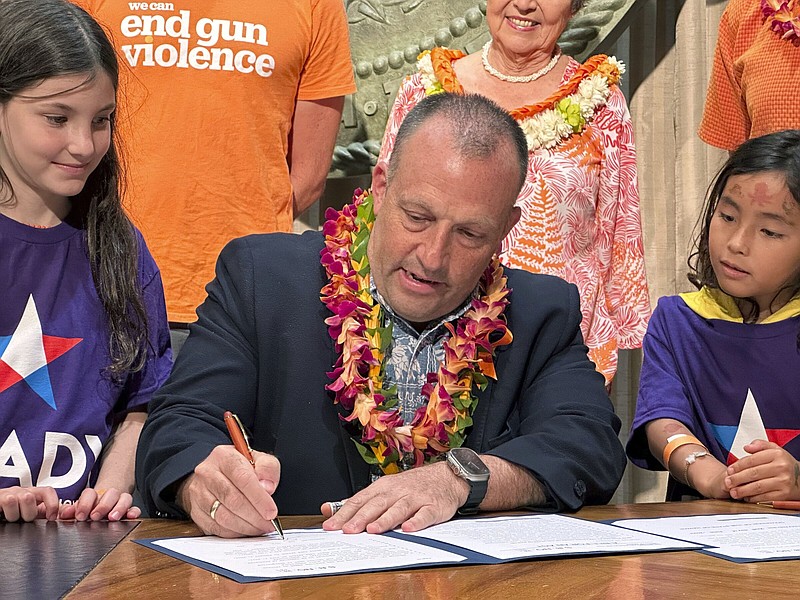HARTFORD, Conn. -- A slate of gun control measures was headed Saturday to Connecticut Gov. Ned Lamont's desk, after an all-night state Senate debate and early morning vote to approve the state's most wide-ranging gun legislation since the laws that followed the 2012 Sandy Hook school shooting.
Lamont, a Democrat, plans to sign the measure. He said in a statement the legislation would "modernize our firearm safety laws in a smart and strategic way to help prevent tragedy from happening."
Among other things, the changes would ban openly carrying firearms and prohibit selling more than three handguns within 30 days to any one person, with some exceptions for instructors and others.
Other provisions include expanding Connecticut's current assault weapon ban to include some other similar weapons; stiffening penalties for possession of large-capacity magazines; expanding safe-storage rules to more settings; and adding some domestic violence crimes to the list of disqualifications for having a gun.
The measure passed the Senate 24-11, following a 96-51 House vote last month. Democrats control both chambers.
Nearly half the states have passed legislation addressing guns or school safety this year, but the measures differ sharply depending on legislatures' partisan makeup.
Democratic-led states have enacted new laws to restrict semiautomatic weapons and expand background checks and waiting periods to buy guns. Republican-controlled states have backed the right to carry concealed guns without permits or for trained staffers to bring guns to school.
In Connecticut, Republican lawmakers have complained that majority Democrats are punishing law-abiding gun owners, not targeting criminals who commit gun violence.
Lamont, however, maintained that "the overwhelming majority of Connecticut residents" supports the changes.
"They want to live in a community that has common-sense measures that encourage gun safety and prevent harm from impacting our neighborhoods," he said.
A DIFFERENT APPROACH
Meanwhile, Hawaii Gov. Josh Green signed Friday legislation that will allow more people to carry concealed firearms but at the same time prohibit people from taking guns to a wide range of places, including beaches, hospitals, stadiums, bars that serve alcohol and movie theaters. Private businesses allowing guns will have to post a sign to that effect.
Green, who has been an emergency room physician in Hawaii for decades, said gun violence is a public health crisis and action needs to be taken to address it.
"On many occasions in my training back on the mainland, I was one of the physicians that took care of individuals who were victims of gun violence. Not only that, I lost a loved one to a suicide with a gun," Green said before signing the measure. "And so anything that we can do, we should."
Rep. David Tarnas, chair of the House judiciary committee, said lawmakers carefully crafted the measure to be consistent with the high court's interpretation of the Second Amendment right to bear arms and also establish what he called a "fair system" for regulating concealed carry permits.
"We aim to create a balanced approach that respects the rights of gun owners and the need to maintain a safe and protected space in Hawaii," Tarnas said.
Hawaii has long had some of the strictest gun laws.
Before the Supreme Court ruling, Hawaii law gave county police chiefs the discretion to determine whether to issue gun owners a permit to carry. Police chiefs issued just six such permits in 21 years.
State law only allowed people to keep firearms in their homes and transport them -- unloaded and locked up -- to shooting ranges, hunting areas and other limited places like repair shops.
The Hawaii Firearms Coalition and Hawaii Rifle Association plan to challenge the new law in court. Attorney General Anne Lopez said her office was prepared to fight these lawsuits.
The state's leaders "are so stupid they cannot tell the difference between someone who doesn't follow the law and commits crimes with firearms and someone that just wants to protect themselves and their family with a gun," said Kainoa Kaku, president of the Hawaii Rifle Association.
Kaku also objected to the anticipated expenses of the new law, estimating it will cost gun owners $1,000 to take all the classes and proficiency tests required to obtain a concealed carry permit that will only be valid for four years.
The governor also signed another bill requiring the state Department of Education to develop a training program to help public and charter schools respond to school shootings.
Information for this article was contributed by Audrey McAvoy and staff members of The Associated Press.
